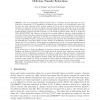Free Online Productivity Tools
i2Speak
i2Symbol
i2OCR
iTex2Img
iWeb2Print
iWeb2Shot
i2Type
iPdf2Split
iPdf2Merge
i2Bopomofo
i2Arabic
i2Style
i2Image
i2PDF
iLatex2Rtf
Sci2ools
138
click to vote
CRYPTO
2010
Springer
2010
Springer
On the Efficiency of Classical and Quantum Oblivious Transfer Reductions
Due to its universality oblivious transfer (OT) is a primitive of great importance in secure multi-party computation. OT is impossible to implement from scratch in an unconditionally secure way, but there are many reductions of OT to other variants of OT, as well as other primitives such as noisy channels. It is important to know how efficient such unconditionally secure reductions can be in principle, i.e., how many instances of a given primitive are at least needed to implement OT. For perfect (error-free) implementations good lower bounds are known, e.g. the bounds by Beaver (STOC '96) or by Dodis and Micali (EUROCRYPT '99). However, in practice one is usually willing to tolerate a small probability of error and it is known that these statistical reductions can in general be much more efficient. Thus, the known bounds have only limited application. In the first part of this work we provide bounds on the efficiency of secure (one-sided) two-party computation of arbitrary fi...
Related Content
| Added | 08 Nov 2010 |
| Updated | 08 Nov 2010 |
| Type | Conference |
| Year | 2010 |
| Where | CRYPTO |
| Authors | Severin Winkler, Jürg Wullschleger |
Comments (0)

